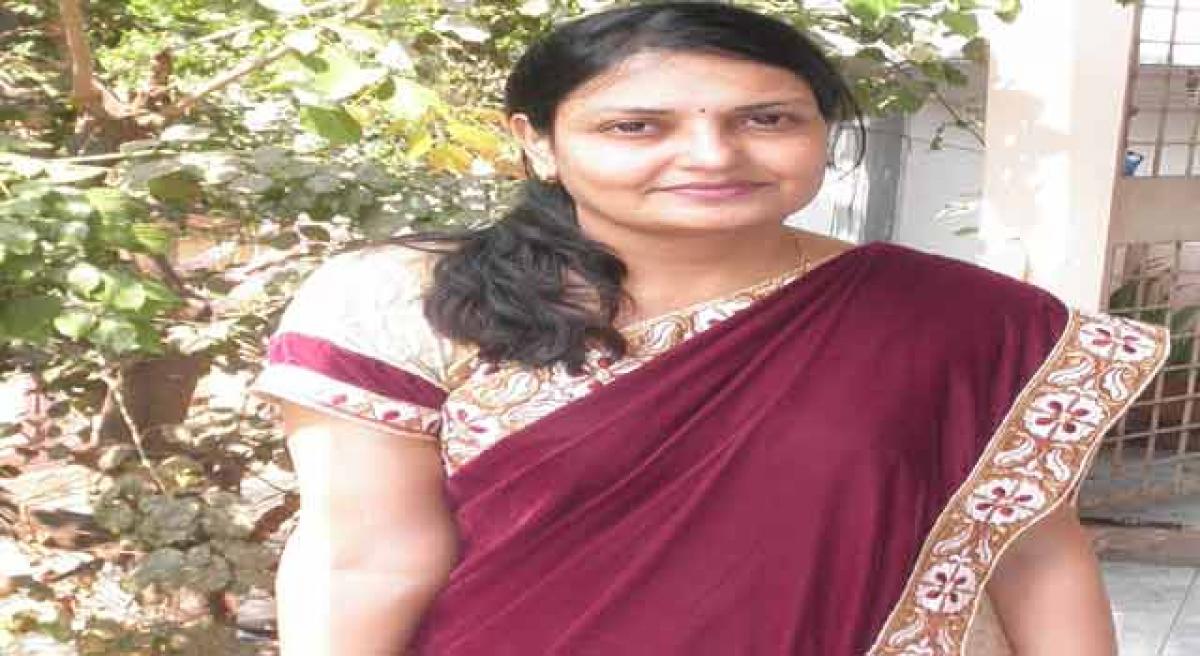Live
- Chandrababu's brother Rammurthy Naidu Passes Away in Hyderabad
- South African President orders immediate closure of tuck shops linked to food poisoning cases
- Study explains mechanisms behind food poisoning, gut infections
- Cases of 'walking pneumonia' rise in US capital, joining national trend
- UN warns armed violence deepens humanitarian crisis in Sudan
- Maha Vikas Aghadi will win over 160 seats, form government in Maharashtra, says Shivakumar
- 6 Factors to Consider While Choosing the Right IVF Clinic in Hyderabad
- PM Modi emplanes for three-nation visit to Nigeria, Brazil, Guyana
- Chandrababu stresses on deregulation in telecom sector at Hindustan Times conference
- MP govt to promote 'Gita Jayanti' like other festivals
Just In

Hyma Goparaju penned her debut book ‘The Withering Banyan’ and it revolves around a family in which members of different generations are affected by mental illnesses. However, lack of awareness and societal compulsions cause the downfall of the family, which has anyways been labelled as ‘mad’.
Hyma Goparaju penned her debut book ‘The Withering Banyan’ and it revolves around a family in which members of different generations are affected by mental illnesses. However, lack of awareness and societal compulsions cause the downfall of the family, which has anyways been labelled as ‘mad’.
The book is an attempt to bring to light an issue, which many individuals and families are combating with. A management graduate from Hyderabad, Hyma spent her initial years working in the industry and is currently with her own firm.
She states that during her entire student life, she has been quite active in extra-curricular activities and strongly believes that they have helped in shaping her into who she is today. In a freewheeling chat the debutante author speaks about her book and her stint with writing.
In your book, the story moves between past and present. Why did you choose to this tricky style for your debut book?
The main story begins in the 1920s. There is also a parallel story, which occurs in the present times. Since there was no point in dividing the book into two halves, I decided to put it in alternate chapters. Readers can notice crucial links between the past and present chapters, which do signify that some things haven’t changed much, even now.
Why did you choose to dwell on Schizophrenia in the book that extensively?
I wanted to highlight the plight of individuals and families battling with this issue. Also, I haven’t come across many stories that delve into mental illnesses in the Indian context.
What is the idea behind the concept of this book?
The idea is to bring to light an issue that is hardly spoken about, through a story. Unlike non-fiction, where loads of writing can be done discussing the issue, I thought a story would invoke more interest.
Why did you choose Banyan Tree as the central theme?
The Banyan Tree has an enormous amount of significance in our culture. It epitomises the large family system and is held in great reverence for its longevity and resilience, which is a hallmark of the family system. It has an important place in the novel too.
How much can you relate to the book?
A lot! The story is in large parts a reflection of what I have seen and how I feel.
Who is your favourite character in the book?
I personally like the character of Sundar who is a friend of the protagonist, Badri. He is extremely brilliant, an inspirational leader and is full of ambition. However, due to unforeseen circumstances, he steers his life into a violent path. His character does not exist through the length of the book but his presence is palpable even when he is not around, and plays a major role in shaping Badri’s life as well.
Are you from a joint family?
I grew up in a nuclear family. However, ours is a fairly big family and summers would be spent at the homes of grandparents with cousins and uncles and aunts. My father was in a transferable job and after completing my 12th class, I and my younger sister went on to live with my maternal grandparents.
My maternal grandfather, Late. Yetukuri Balarama Murthy was himself an accomplished writer. Every joint/extended family has both good and not so good times and yes, like any average Indian, who is a part of the large family system, I can also say that I have seen both sides. In my book, which is purely fictional, many instances the characters face are written keeping in mind what generally happens.
When did the writing bug bite you?
I used to write poetry while in school. However, due to my professional and personal commitments, I did not get a chance to pursue writing for a very long time. In fact, I never thought of turning into a writer. I think it was sometime around 2011, that I decided to take the plunge and it was quite an instinctive decision. But I am glad I did so.
Who are your favourite authors?
I have many favourite authors. Among Indian authors, I like reading Amitav Ghosh and among foreign authors, I like the works of Ayn Rand.
What is the right process to start writing a book?
Honestly, I feel that there is no formal process involved. I guess every writer has a different approach. When an idea is formed, I think the best process is to just begin writing. However, some ideas/subjects require plenty of research and such ideas do go on to take longer time to materialise.
Now, the debut book is on the shelves and getting good reviews. What are your future plans?
I want to write more and am hoping that readers will accept and appreciate my future works too. I do have a couple of ideas and am working on them.
By:Navin Pivhal

© 2024 Hyderabad Media House Limited/The Hans India. All rights reserved. Powered by hocalwire.com







